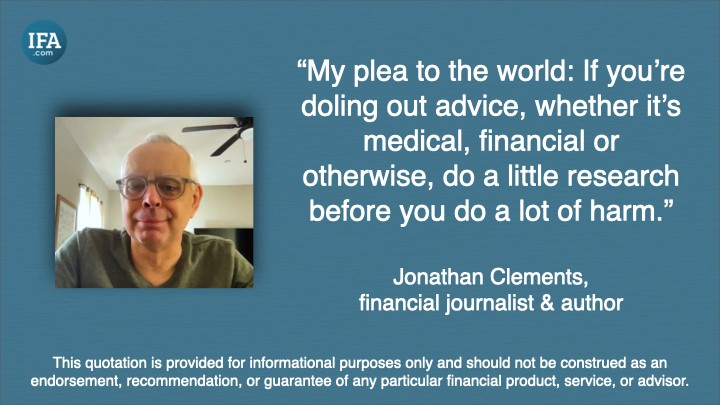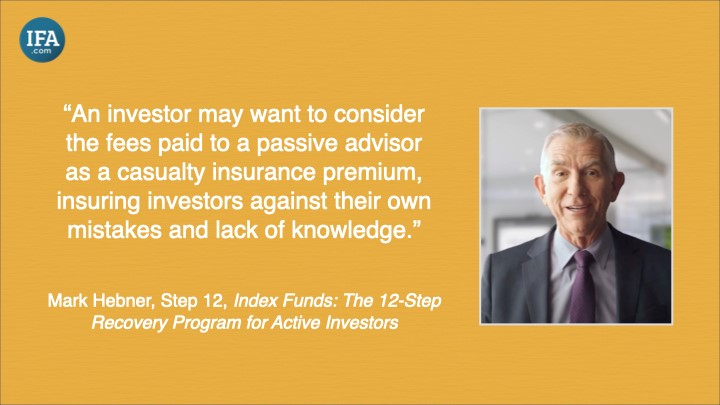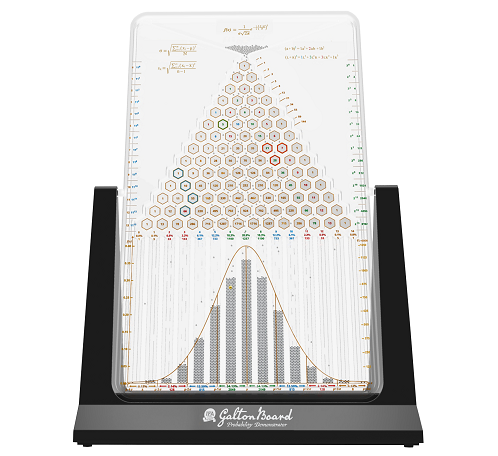You wouldn't dream of listening to medical or investment advice from random people in the street. But that's effectively what we do when we pay attention to social media influencers.
There are influencers everywhere. A 2023 study suggested that about 3% of the U.S. population — around 10 million people — could be considered influencers at that time, and the percentage has likely grown since then.
But, as financial journalist and author Jonathan Clements recently wrote, the advice that influencers dispense can lead to poor financial decisions that may negatively impact invostor' financial health.
If you watched or listened to my recent interview with Jonathan on The Scientific Investor Podcast, you would know that he has terminal cancer. "Multiple times each week," Jonathan revealed on his HumbleDollar blog, "I receive messages offering advice that has the potential to severely damage my health… My plea to the world: If you're doling out advice, whether it's medical, financial, or otherwise, do a little research before you do a lot of harm."

How FinFluencers Get Paid
The financial world is teeming with influencers, or "finfluencers" as they are often known. A Forbes study in 2023 found that almost 80% of millennials and Gen Zers have received financial advice from social media. Yet, as another study last year showed, 63% of financial advice on TikTok is misleading.
A fundamental fact about finfluencers that many people don't understand is that most of them are paid by financial companies to promote their products and services. The influencers are given, say, a sign-up link, or a promotional code, which means they can be paid commission for every lead or sale they generate.
Now, in the interests of full disclosure, I am a financial influencer myself. I have a commercial incentive in directing consumers towards financial businesses whose philosophy and values I share. There is nothing wrong, per se, in companies paying third-party influencers for generating business. But it's a system that is open to abuse, as a recent case brought by the Financial Industry Regulatory Authority (Finra) against the trading platform Robinhood shows.
Robinhood Fined Over Its Use of FinFluencers
Finra investigated Robinhood's use of finfluencers between November 2019 and March 2023. During this period, customers opened at least 25,000 new accounts using the referral links provided by Robinhood, resulting in the firm paying around 75 influencers a total of more than $2.7 million.
However, Finra found, Robinhood failed in its regulatory duties in several key respects. For example, it didn't review and approve the influencers' content before it was published or maintain records of communications posted by influencers that promoted the firm.
Finra investigators found that influencers published social media posts about the firm's products and services that included statements that were "misleading, exaggerated, promissory, and not fair and balanced."
One influencer, for instance, in a video about purportedly high-dividend-earning stocks, stated: "(The) dividend income is just going to continue increasing and increasing and increasing to where eventually it will be able to pay all of your costs so you could live financially free."
Influencers also posted communications claiming that Robinhood was completely free without disclosing that, in many cases, fees do apply.
For these and a range of other violations of Finra rules, Robinhood has been fined a total of $26 million. It was also ordered to pay restitution to more than 10,000 customers. The regulator's findings are outlined in a letter of acceptance, waiver and consent, more than 120 pages long.
This is not the first time that Finra has fined a firm over the use of paid influencers. In March 2024, the brokerage app M1 Finance was fined $850,000 for hiring an "army of influencers" who advertised false claims about the company.
Lessons for Investors
What are the lessons for investors to learn? First of all, be aware that the use of paid finfluencers is now extremely common and is likely to become more so.
This doesn't mean that all influencers dispense bad advice. But bear in mind that the barrier of entry for this type of work is very low indeed. Influencers may have no relevant qualifications and only a very basic understanding of investing or how the financial markets work.
Some finfluencers have been associated with scams such as the so-called "crypto rug pull," where developers create a new token, heavily promote it to attract investors, and then suddenly withdraw all liquidity, leaving investors with worthless assets.
You need to be very skeptical of hype. If an influencer claims you can "get rich quick" or promises high returns with little risk, be extremely cautious. Legitimate investments always carry some level of risk. Urgency tactics — for example, "Invest now before it's too late!" — are a definite red flag. And steer well clear of unlicensed platforms or investments that lack oversight from financial regulators.
Always verify an influencer's qualifications. Just because someone has a large following doesn't mean they are a licensed financial professional. Genuine financial experts usually hold credentials like Series 65 license, CFA, CFP or CPA.
However, the best advice is to consult an experienced financial professional before you even consider acting on a recommendation you read online. Don't just seek out any advisor. Speak to a Registered Investment Advisor (RIA) who has what's called a fiduciary duty to their clients — in other words, they are legally required by the U.S. Securities and Exchange Commission (SEC) to put the client's interests and needs above their own at all times. An RIA is paid solely for advice, accepting no compensation for any investment products or trading recommended to clients.
As Mark Hebner explains in Step 12 of his award-winning book, The 12-Step Recovery Program for Active Investors, a trusted passive advisor acts as "our fiduciary and guide through the peaks and valleys of the market, away from the temptations of speculation and toward a more rewarding and tranquil way of investing."

Don't be tempted by the siren song of unqualified finfluencers. Find yourself a fiduciary advisor instead.
Robin Powell is the Creative Director at Index Fund Advisors (IFA). He is also a financial journalist and the editor of The Evidence-Based Investor. This article reflects IFA's investment philosophy and is intended for informational purposes only.
This article is intended for informational purposes only and reflects the perspective of Index Fund Advisors (IFA), with which the author is affiliated. It should not be interpreted as an offer, solicitation, recommendation, or endorsement of any specific security, product, or service. Readers are encouraged to consult with a qualified Investment Advisor for personalized guidance. Please note that there are no guarantees that any investment strategies will be successful, and all investing involves risks, including the potential loss of principal. Quotes and images included are for illustrative purposes only and should not be considered as endorsements, recommendations, or guarantees of any particular financial product, service, or advisor. IFA does not endorse or guarantee the accuracy of third-party content. For additional information about Index Fund Advisors, Inc., please review our brochure at https://www.adviserinfo.sec.gov/ or visit our website at www.ifa.com.














